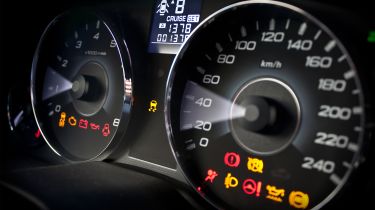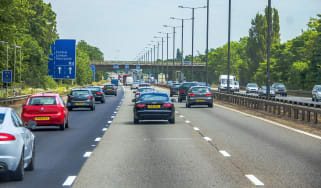Limp mode: common causes and how to fix it
Limp mode is designed to protect your engine if something goes wrong. We cover the causes and how to fix it

Modern cars are generally pretty reliable, but if something serious does go wrong, there’s a chance that your car will enter ‘limp mode’. Also referred to as ‘limp home mode’, it serves as a safety net to protect your engine and other mechanical components from further damage by limiting power.
You’ll notice the drop in power if your car enters limp mode, along with the car shutting off its non-essential features, such as the air-conditioning and stereo. In this guide, we’ll cover what to do if your car enters limp mode, as well as common causes and how it can be rectified.
 Car maintenance: the DIY essentials for looking after your car
Car maintenance: the DIY essentials for looking after your car
In nearly every case, limp mode will be accompanied by an engine management light. We have a full explainer for the top causes of an engine management light, as well as a guide to the most common dashboard warning lights.
What is limp mode?
Limp mode, also known as ‘limp home mode’, is a computer-activated engine mode that restricts engine power and shuts off non-important functions in order to protect the engine when a fault is detected.
By restricting engine power and switching off features such as the air-conditioning and heater, the load on the engine is reduced, minimising the possibility of any damage. The engine will be just powerful enough for you to drive slowly and stop in a safe location.
What causes limp mode?
Limp mode will automatically be triggered by the car’s engine control unit (ECU) if it detects a fault. Your car uses a variety of sensors to monitor everything from engine temperature to electrical voltage and fluid levels. If the ECU receives an abnormal signal from one of these sensors, or one that suggests a serious problem, it can trigger limp mode in order to protect the engine.
Limp mode could be caused by a fault with one of the sensors itself, which is likely to be the least worrying cause. Other non-critical causes could be low oil and engine coolant levels, or faulty electrical wiring. More serious issues include gearbox and clutch malfunctions, brake problems, or engine failure.
How do you know if your car is in limp mode?
When limp mode is activated, the least important features in your car, such as air conditioning and the stereo, will switch off and the ‘engine management light’, or ‘check engine light’, will appear on your dashboard. The most notable change, however, will be a sudden reduction in the car’s speed and, usually, a limit to the number of gears available (usually up to third gear). This is to prevent further damage to the car and potentially prevent an accident that could happen as a result of the fault.
What do I do if my car goes into limp mode?
If you notice that your car has gone into limp mode, keep calm and focus on getting your car home or to a safe place. Where exactly you decide to stop will depend on distances, how the car is behaving and how far you feel comfortable to drive it. Once stopped, turn off the car. If you couldn’t hear anything wrong with the engine or gearbox and suspect that limp mode was triggered unnecessarily, you can try restarting the car after 20 seconds to see if it has cleared. If you suspect a more serious issue, you will have to contact your recovery service.
Do electric and hybrid cars have a limp mode?
As hybrid cars use a traditional combustion engine alongside their electric motors, they can enter limp mode in the same way as a regular petrol or diesel car. Fully electric cars do not have an engine, so will not enter a typical limp mode if something goes wrong.
Instead, if there is a problem with the battery and electric drive system, hybrid and electric cars will enter a slightly different limited power mode, indicated by the limited power warning light. This warning light looks like a tortoise, and signifies that the electric drive system is running on low power.
This could be caused by a number of issues, ranging from a damaged battery to something as simple as a low battery state of charge.
How fast does a car go in limp mode?
Limp mode will likely reduce your maximum speed to anywhere between 35 and 45mph, and revs (RPM) will be limited to 2,000 or 3,000. This is to allow you to continue driving at a safe speed until you’re able to stop and seek help. As mentioned above, it’s likely you won’t be able to shift above third gear.
How do I get my car out of limp mode?
When you’ve reached a safe place, you should turn off your engine and ignition. If you believe the issue was a temporary glitch, or simply want to check if it’s corrected itself, it’s recommended that you wait 10 to 20 seconds before switching your ignition back on and turning the engine over. If the warning lights have disappeared and the car appears to be performing as it should, then it’s likely that limp mode was the result of a faulty sensor.
It’s still important to have your car checked over by a mechanic to ensure nothing is amiss and to prevent the car from unnecessarily entering limp mode again. If, however, your vehicle doesn’t reset, especially if you’re on the roadside, you should call for roadside assistance.
How much does it cost to fix limp mode?
The cost of repairing your car will vary depending on what’s causing it to enter limp mode. More often than not, your car will stop going into limp mode when a faulty part is replaced, electrical wiring or connections are replaced or fixed, or critical fluids are topped up. Keep in mind that if your car keeps entering limp mode and you keep ignoring it, you could potentially be doing further damage and thus adding to the final repair bill.
Read our engine management light guide to learn the top five causes of an amber engine warning light.
Recommended

Classic car tax exemption: which historic vehicles qualify?
Most Popular
Tips & advice

Car dashboard warning lights: what does each symbol mean?

Electric car charging stations: public networks, charger types, apps and maps








